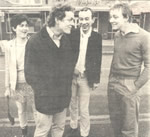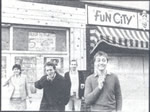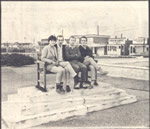Some time in the life of a female singer
from Dublin and a thin book saleman
...and a quiet drummer and a bassist who
used to want to be Jack Bruce - an insight, in fact, into
the enigmatically titled prag VEC. This feature may appear
to start in the middle. This is not the case. It starts
here...

By: John Hamblett
Pix: Mike Kaye
Sue: We went to see 1900 the other day.
John: I told him.
Sue: We also went to see The All Round Reduced Personality.
Hamblett: Wait till you see The Warriors.
Sue and John: We've seen it.
Hamblett: It's great.
John: It's shit... it stinks.
Hamblett: It's definitely on a par with Saturday Night
Fever.
Sue: Yeah.
John: It doesn't quite smell as bad as that.
Hamblett: It's just entertainment.
John: It's not quite good enough entertainment though.
Sue: The women in it were terrible.
John: The music in it was terrible.
Hamblett: It was great fun... like Tom and Jerry.
John: Very much like Tom and Jerry.
Sue: The men were all really good at fighting and the women
didn't fight at all...
Hamblett: Good. Women don't fight.
Sue: I do.
Hamblett: In real life maybe, but not in the movies.
Sue: They used bits of real life.
Hamblett: No they didn't.
John: They could've used a few laser pistols and a bit
more music.
Hamblett: So, can all movies change your lifestyle?
Sue: They should.
Hamblett: What about music? Abba don't change anybody's
lifestyle.
John: Abba are great. Classics, I like pop songs, I'm greatly
influenced by pop songs.
Hamblett: Don't send me up...
John: I'm not, I'm not... He says I'm sending him up because
I say I like pop songs, that's a lie isn't it? Don't I like
pop songs?
Sue: He does. Which pop songs do you like?
John: Anything... I don't like po-faced intellectuals.
Hamblett: If you want to be a revolutionary go throw bombs
at police cars.
John: I agree, you're right. I don't want to be a revolutionary...
It's quite a different occupation really.
Sue: He doesn't throw bombs.
Hamblett: So what does rock'n'roll influence?
John: To my mind it seems to influence the type of commercial
on the TV. Lee jeans and laser beam eyes, leather clad punk
arses bouncing up and down on Myer's beds...
 THE
NIGHT before, Sue had come second in a talent competition
in her local pub. Although there were only two entrants
she was fluorescently content with her peculiar renditions
of 'Laughter In The Rain', and 'Close To You' and smiles
accordingly every time she has cause to recount the tale.
Tonight, although overtly concerned with her own liberation,
nobody turns to stare as she clips through the frosty glass
doors.
THE
NIGHT before, Sue had come second in a talent competition
in her local pub. Although there were only two entrants
she was fluorescently content with her peculiar renditions
of 'Laughter In The Rain', and 'Close To You' and smiles
accordingly every time she has cause to recount the tale.
Tonight, although overtly concerned with her own liberation,
nobody turns to stare as she clips through the frosty glass
doors.
She is dressed in a mildly indisciminate mingling of this
and that (unisex paraphernalia), and supports a moderate
amount of mid-brown hair that looks as though it may become
long before much longer.
She says to me: "I have a chip on my shoulder. People
are always telling me how to behave, because I behave badly.
They say I shouldn't fart or belch, so I fart and belch.
They say I shouldn't swear, so I swear. I upset people.
I'm not a girl or a lady, I'm a woman."
A woman with a nose that is half-inclined to turn up, a
small mouth, a roundly unobstrusive accent and firm beliefs.
Like most people you meet in pubs Sue is a curious and
typical alloy of old and young. She was born and raised
a Catholic in Dublin; nature, consequence, coincidence,
and curiosity have brought her as far as a council flat
in Shepherd's Bush where she lives when not shopping, working,
walking or singing in a group called prag VEC.
 Occasionally
she will say things like this: "All my songs are hate
songs." But don't take that too seriously.
Occasionally
she will say things like this: "All my songs are hate
songs." But don't take that too seriously.
Sue and the other members of prag VEC are seated in a reasonably
large pub - not entirely through choice. The place has a
confusingly regular attitude, built, it would appear, solely
for the purpose of defying description (even the wall-paper
is unexceptional).
The people, however, are as blendedly individual as ever
could be, all playing their given roles with a brave and
determined furrow of the brow. Little do they realise...
or perhaps, on the other hand, they realise perfectly well.
prag VEC certainly do; they are in the unenviable position
of fully realising their importance in this scene without
quite understanding why, wherefor, or whatever.
John sits hunched towards the table. At one point he will
say: "Our music is just a reflection of the sado-masochism
implicit in all relationships... I mean, the agency sent
us, y'know?"
John works in a book shop. Before that he studied at Essex
University. He used to paint, he plays guitar, and confesses
to liking steaks, kebabs, movies, juke boxes, and the radio.
And he drinks Guinness.
If Sue looks wavy, John looks straight up and down - angular,
almost. His short dark hair could well be described as cataleptic
in certain quarters, and his face looks fragile and madly
scooped out.
The greatest work of art he has ever seen was created by
a green grocer who owns a stall in a street market. The
old green grocer's work of art is a regular Saturday night
performance which involves him getting up in his local and
giving a perfect impersonation of Nat King Cole to piano
accompaniment.
John is impressed with the perfection and integrity of
the performance, and the fear of the performer. (I only
mention this in passing as John claims that such characters
people his reality.)
lf you were to ask John and Sue what Would happen if prag
VEC became famous Sue would reply: "We'd make money,"
and John would add, "and spend it."
When they are forced to say things like that they export
an impression of comical honesty qualified with a sensible
desperation that lounges in the short, dusty spaces that
follow, silently, half-way between a frown and a laugh.
John, by the way, writes most of the music for prag VEC.
The songs are imperfect, insinuating, and passionate wedges
of excited ideas, interesting notions, committed ideas,
and crisply encountered situations, placed with mad care
into short bouncing balls.
Songs like the four quirky, seductive and witty tracks
on their debut EP released last year on their own Spec label.
(If you haven't got a copy the HMV shop in London's Oxford
Street still has some, though it's probably not worth making
a round trip of more than say, 50 miles.)
Nick has a face that brings soft adjectives quickly to
mind. He believes certain things, but is prepared to believe
otherwise if proof is provided. His fair hair drops in a
naive fringe, and he speaks as though not wishing to make
a nuisance of himself.
Nick's first drum kit consisted of a space hopper, the
pedals on a piano and two knitting needles - an interesting
variation on the biscuit tin and two knitting needles norm.
And once he auditioned for 999.
Dave is the largest, and while his complexion may not always
be of such a ruddy hue, I'm quite sure his hair is naturally
curly. He plays bass.
Why did he join prag VEC:
"Because I found myself growing up for a change. Growjng
up among responsible, humane people."
Sue tells me he used to want to be Jack Bruce but is okay
now, while simultaneously offering me a pinch of salt. Dave
tells me that he is completing his final year at college
studying graphic design.
I toss the pinch of salt over my left shoulder.
For quite long periods Dave does not appear to move. At
such times, the power to do so seems to have deserted him.
I try not to feel concerned, or take it personally.
prag VEC react to things that concern them, and others,
in a positive fashion. Their music suggests this, and their
conversation confirms it. They do not wish to be seen as
an isolated collective creating unrelated slices of consumable
culture. I mean, given the choice they would rather be lamp-posts
than picture frames, or even pictures - in a manner of speaking.
THE AESTHETICS OF BEING EARNEST (FROM
1 T0 5 INCLUSIVE)
1/Sue: I had a guitar when I was about 15. I had a copy
of 'Highway 61 Revisited', and I learned to play 'Tambourine
Man'. I remember sitting in my bedroom playing it and I
could hear my brother and his friend outside the window.
They were laughing at me. They obviously thought I had some
aspirations to be a star... (Laughs) Perhaps they were right.
 2/John:
It seems to me that the new bands who have signed up with
major record companies in the last couple of years have
been forced into their own little worlds. Their approach
to their music becomes insular because of that. If we can
live by avoiding the situation of having to become big stars
for the record company then we can escape into other people's
worlds very easily. That's the way we retain control. We
write what we want to and play it the way we want to. We
don't conform to a strict concept, like say, the heavy metal
bands. They only exist as part of a concept. People who
go along to see a band like Rush don't simply go along to
see Rush, they go because they are carrying on a tradition.
We're not.
2/John:
It seems to me that the new bands who have signed up with
major record companies in the last couple of years have
been forced into their own little worlds. Their approach
to their music becomes insular because of that. If we can
live by avoiding the situation of having to become big stars
for the record company then we can escape into other people's
worlds very easily. That's the way we retain control. We
write what we want to and play it the way we want to. We
don't conform to a strict concept, like say, the heavy metal
bands. They only exist as part of a concept. People who
go along to see a band like Rush don't simply go along to
see Rush, they go because they are carrying on a tradition.
We're not.
3/Sue: I'm not interested in just being a performer, or
just an entertainer. I want to shock some people. I was
in a band before this and some of the people who came to
watch us just did not want to entertain. I wanted to scare
the shit out of them.
John: I like going to watch bands - I don't like listening
to records much - because it's more than just music and
lyrics, image, fashion, dress. It's very simple theatre.
It's a very direct theatre, mostly about communicating some
kind of feeling between the performers and the audience,
like: "We are having a good time" or; "We
are not having a good time... We are having a bad time".
Reading what people have to say in music paper interviews
is a load of cock. It doesn't have any relation to that
experience. You might just as well talk about the things
they used to talk about in the old days - like what colour
socks they wear, and what their favourite lunch is... Actually
I like four little sausages, a fried egg and some coleslaw.
I don't know, you might just as well get a bunch of back
covers off the Penguin Modern Classics and say this is me.
4/Sue: When I'm writing songs I sit down and pick a victim,
something really straightforward. When I was working in
the canteen at Shepherd's Bush Telephone Exchange, for example,
there were a lot of-old ladies working there and when the
tea break time came round they'd all have their fags out
and they would just sit around and talk about the kind of
cigarettes they smoked. That's how 'Cigarettes' came about.
John: When I'm writing music I just start off with an arrangement
of chords that I think sounds nice, but by the time it gets
to the point where everybody is playing their individual
part a lot of ideas have gone into it.
Sue: The content should dictate the style. We are very
humorous. I think we used to try a lot harder to be humorous.
For instance we do a song called 'Stay'; it's a Bob Dylan
song - 'Lay Lady Lay' - and we cut up all the words and
pulled them out of a hat completely at random, and we got
some very funny lines that way. Lines like: "Why stay,
Lady? Why Stay? Him dirty eat you." It's a very ambiguous
love song.
John: It works so well because although it's a cut-up it's
taking the piss out of people like Burroughs.
Sue: In 'Stay' the sex angle comes out much stronger than
the way Dylan did it. Dylan wrote it very romantic and sentimental.
John: Like they weren't going to do anything dirty... It's
not about sex at all really, it's about the things people
do to each other, and quite often the things people do to
each other are dirty. The Romantic ideology is dirty. The
Romantic poets were real deep stuff, escapism, and euphemisms,
and they're really not talking about that, they're talking
about fucking.
Sue: We got a letter from somebody in Long Kesh, who'd
been there for seven years for armed robbery. He wrote a
letter saying that he liked the band, so we wrote back to
him. Then, he wrote again with a translation of 'Existential',
asking me to correct it... There are only two words in the
song that are important; "Existential, and "capitalist".
Those are the only two important words.
John: 'Existential' is only comic book French.
Sue: Dave came up with a bass riff that we latched onto
and somebody said that it sounded like the music from a
French detective film. You get French bands singing songs
in English and nobody say that's pretentious... It's fucking
English imperialism; everybody should speak English.
5/Sue: You say a lot about what sort of band you are by
the name you chose. It's our name and it's our music. If
you say that prag VEC are a rock'n'roll band it's not the
same as saying The Clash are a rock'n'roll band.
John: Most names mean something, most names say, we are
this - like The Clash - conflict... it's very conceptual.
Our name is just a batch of words.
Sue: If we don't do anything then the name doesn't mean
anything. We are prag VEC.
John: We didn't want a name that suggested we were deep,
or had a lot to say. We don't have a collective image -
we don't have a manifesto.

